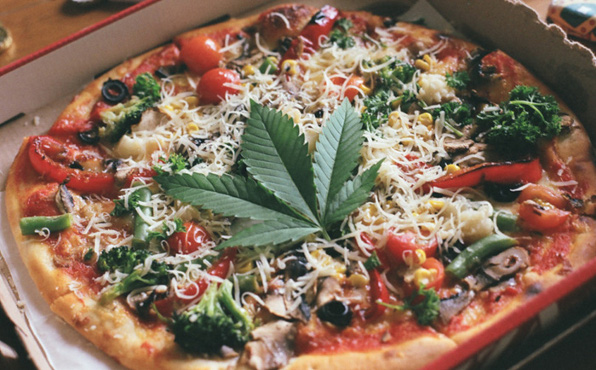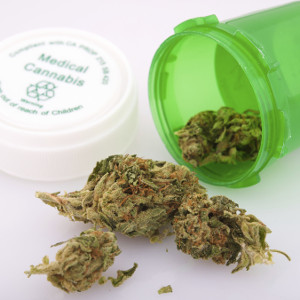Readers elsewhere will probably have heard by now that Cannabis (Marijuana) has been legalized, nationally, in Canada. So this post, sharing research on the reason the weed makes you hungry, is not only timely here at home, but – dare I speculate? – of universal interest and impact…
 Cannabis Pizza: Kills two cravings with one stone. Literally.
Cannabis Pizza: Kills two cravings with one stone. Literally.
First, allow me to issue a disclaimer. I may be one of only about a dozen people of my generation who didn’t try marijuana back in the day. I was, in fact, a puritan about drugs, having had the living Bejeezus scared out me about them by my parents, and the firsthand knowledge of a relative who had become addicted to something in the opiate family trying to deal with unrelenting pain from an old war wound. But, when you were a teen in the 60s, like I was, the stuff was all around you, and you knew as much about it – truth and myth – as anyone else in your social circle.
Enter, The Munchies…
Ah, yes… The Munchies! Both the pleasure and pain of many a weed whacker of my ancient acquaintance. There was no question that toking-up made the imbiber ferociously hungry, but, until recently, the actual somatic mechanisms by which this state came about were unknown.
Now, researchers at the Department of Integrative Physiology and Neurosciences at Washington State University say they’ve finally gotten around to figuring out what may rank as one of the last century’s great unsolved mysteries.
The study, in a nutshell…
“We all know cannabis use affects appetite, but until recently we’ve actually understood very little about how or why,” explained Dr. Jon Davis, Lead Spokesperson for the study. “By studying exposure to cannabis plant matter, the most widely consumed form, we’re finding genetic and physiological events in the body that allow cannabis to turn eating behavior on or off.”
Scientists conducted a study in rats, rather than using people, in spite of the fact that cannabis is now legal for recreational use in the State of Washington. Maybe they were afraid the huge flood of human volunteers would create unwanted logistical issues at their offices.
Anyway, they designed a vapor exposure system to ‘mimic how people often consume cannabis’. This allowed precise control of dosage while rats’ meals were closely monitored throughout the day. Brief exposure to cannabis vapor stimulated a meal even when rats had recently eaten, suggesting that inhaling cannabis tricks appetite circuits in the brain into hunger mode.
Clinical observations…
The experimental results did indicate that the rats got the munchies after inhaling weed, but noted that the effect rook a little while to come on. That delay provided a clue to how the drug may act. Ordinarily, when the stomach is empty it releases a hormone called ghrelin, a message to the brain that it’s time to look for food. The researchers found that the cannabis dose triggered a ghrelin surge. When they gave a second drug which prevented the ghrelin surge, cannabis no longer triggered eating. They also found changes in how the brain responds to the message. In small region of the hypothalamus responsible for sensing ghrelin, cannabis changed the genetic activity of brain cells that respond to the hormone.
Implications…
Dr. Davis says further study of the Munchie Effect may produce lead to new treatments for illness-induced anorexia. Severe appetite loss is a common symptom of many chronic illnesses, and is especially problematic in cancer, HIV/AIDS, heart disease, and some metabolic disorders. A targeted treatment that offers the beneficial effects of cannabis on appetite without the broader effects on the mind and body could increase quality of life and speed recovery.
And, if you consider the ability of ghrelin to turn off the hunger response, there may be a whole separate opportunity, here, to develop a targeted treatment for obesity…
~ Maggie J.

